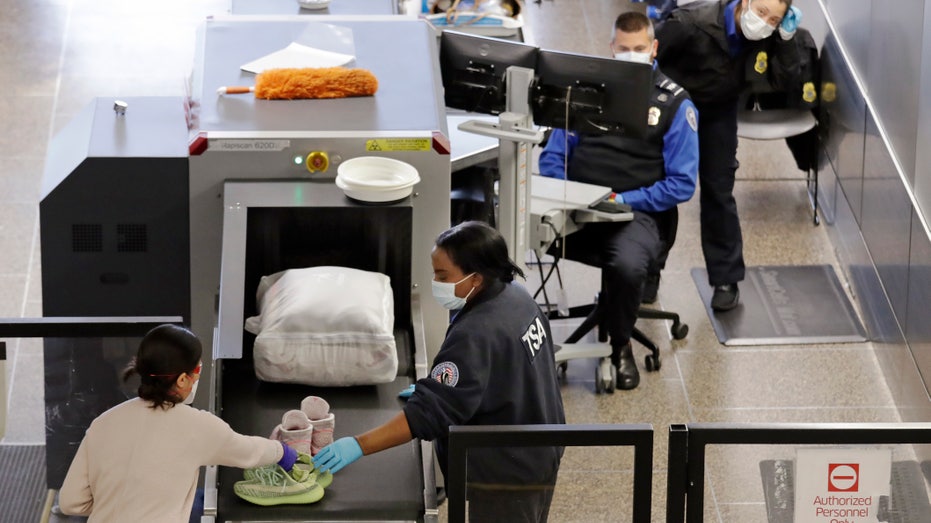Frontier to implement temperature checks; TSA tells its employees to wear masks at checkpoints
Passengers with temperature of 100.4 degrees Fahrenheit or higher will be denied from boarding Frontier flights
Get all the latest news on coronavirus and more delivered daily to your inbox. Sign up here.
Frontier Airlines announced Thursday that it will implement mandatory temperature screenings for all passengers and employees starting June 1 in order to minimize the risk of spreading the coronavirus.
“The health and safety of everyone flying Frontier is paramount and temperature screenings add an additional layer of protection for everyone onboard,” said Frontier Airlines CEO Barry Biffle in a press release, “This new step during the boarding process, coupled with face coverings and elevated disinfection procedures, will serve to provide Frontier customers an assurance that their well-being is our foremost priority and we are taking every measure to help them travel comfortably and safely.”
BIG 4 AIRLINES TAKE ON CORONAVIRUS WITH NEW SAFETY MEASURES
If a passenger's temperature reading is 100.4 degrees Fahrenheit or higher, they will be given time to rest, if the flight departure time allows, before receiving a second check. If the second check is 100.4 degrees or higher, the passenger will be denied from boarding and Frontier will work with that customer to rebook travel for a later date.

In this April 23, 2020 photo a Frontier Airlines jetliner taxis to a runway for take off from Denver International Airport in Denver. Lawmakers on Capitol Hill lashed out Wednesday, May 6, 2020 against Frontier Airlines over the budget carrier's move
Additionally, all Frontier employees will be unable to work if their temperature is 100.4 degrees or higher at the start of their shift. The airline says it will not maintain a record of the temperatures of its passengers or employees.
FRONTIER AIRLINES WILL DROP OPEN-SEAT FEE THAT DREW CRITICiSM
The decision by Frontier comes the same day as the Transportation Security Administration's announcement that all of its employees working at airport screening checkpoints will be required to wear masks.
“TSA is making this change to protect our employees and travelers as social distancing cannot always be maintained in the screening process.” said TSA Administrator David Pekoske.
The TSA encourages all airline passengers to wear facial protection, which most of the major airline passengers will be required to do starting this month. According to the TSA, individuals may be asked to momentarily lower their facial covering for identity verification purposes or if it is picked up by the agency's screening equipment.

TSA agents wear masks as they screen passengers at Seattle-Tacoma International Airport Wednesday, April 15, 2020, in SeaTac, Wash. Flights at the usually busy airport have dropped from up to 1,300 a day to about 400 each day. (AP Photo/Elaine Thomps
HOW TO FLY DURING CORONAVIRUS PANDEMIC: 6 TRAVEL TIPS FROM TSA
As states begin phased re-openings of their economies, there has been an uptick in air travel in the past week.
According to the TSA, a record 154,695 passengers were screened on April 30, coming off its coronavirus pandemic lows from the beginning of April when screenings dropped 95 percent.
In order to show passengers that they are taking the strongest possible safety precautions, American Airlines announced last week that it would be the first airline to offer personal protective equipment to customers. Competitors Jet Blue, Southwest, Delta and United also mandated facemasks onboard as well as in jetways.
United, Jet Blue, and Delta also announced they would be offering free flights to health care workers on the front lines of the pandemic.
Other measures include Frontier and Delta blocking middle seats on flights in order to promote social distancing.
GET FOX BUSINESS ON THE GO BY CLICKING HERE
The increased safety measures by airlines and the TSA come as the coronavirus has ravaged the airline industry.
| Ticker | Security | Last | Change | Change % |
|---|---|---|---|---|
| UAL | UNITED AIRLINES HOLDINGS INC. | 116.20 | +0.29 | +0.25% |
| AAL | AMERICAN AIRLINES GROUP INC. | 14.99 | -0.25 | -1.64% |
| LUV | SOUTHWEST AIRLINES CO. | 53.36 | -0.90 | -1.66% |
| DAL | DELTA AIR LINES INC. | 75.00 | -0.35 | -0.46% |
| JBLU | JETBLUE AIRWAYS CORP. | 6.16 | -0.20 | -3.14% |
American Airlines reported a $2.2 billion loss due to the coronavirus, while competitors United and Southwest saw losses of $2.1 billion and $94 million respectively. Last month, the federal government bailed out the airline industry with a $25 billion coronavirus relief package.




















